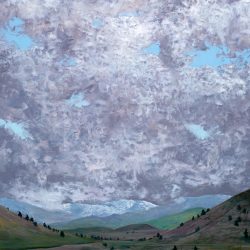Pilgrims crossing a dark valley, unable to shake off the sorrow.
 Since bass player Aron Christenson was killed two years ago while hiking with his dog near Walput Lake in Lewis County, Oregon, guitarist Ezra Meredith of Hearts of Oak has been waiting for justice to be served for their allegedly murdered friend. Christenson was one of their companions during a camping excursion. Given the mess that’s been made of the investigation, that wait may be a long one.
Since bass player Aron Christenson was killed two years ago while hiking with his dog near Walput Lake in Lewis County, Oregon, guitarist Ezra Meredith of Hearts of Oak has been waiting for justice to be served for their allegedly murdered friend. Christenson was one of their companions during a camping excursion. Given the mess that’s been made of the investigation, that wait may be a long one.
The wait for the fifth Hearts of Oak album, however, an ambitious, 100-minute double-LP (no CD) entitled “Valley of Dark Hills” will be over in October with its release on Deer Lodge Records. This sixteen-track journey through Crazy Horse-inspired burners and Jerry Jeff Walker-infused barroom rippers is a departure from their previous album, “Moves” (2018). The band’s music has been termed “shoegazer Americana” and “a singer-songwriter with a druggy, psychedelic backing band.” Sure, we’ll go with those cryptic descriptions.
At least the evidence indicates the songs haven’t been botched. Songwriter Nate Wallace reflected on the creation of Valley of Dark Hills, saying: “I didn’t want the press for this record to be all about Aron’s death, but no matter how you slice it, it is the crux of this double LP. We had started recording on a reel-to-reel at our weekly practices. We were laying new songs down live and planned to flush them out later, having no idea how much later that would be.”
He was referring to yet another COVID-induced delay when one band member left and Wallace himself stopped coming to sessions. “Aron, Jay, and Ezra were the holdouts and, without me there to sing my songs, they kept on trucking and laid down a few of Ezra’s old country songs, a couple covers: Dead Moon’s ‘Spectacle’ and a song written by one of our friends, Mike ‘Reno’ Lund, who had passed away, aptly titled ‘Dearly Departed.’ These two fit right in with Hearts of Oak’s typical offerings.
Everybody in the band scattered far and wide, gone to other projects, but the stored recordings were not forgotten. They stayed in touch and finally agreed to get back to work on the project, intending to whittle it down to a single album but couldn’t cut enough from the tapes to manage that. A suggestion would be to have started by jettisoning the 16-minute synth-laden instrumental.
A sampling of the band’s previous recordings reveals a progression from some rather sombre songs to a sort of psychedelic country rock that has a pinch more hope in the sorrow and sadness on a few of the songs, as in the first track. So turn up the radio set the chickens loose, in the evening bring ‘em home to roost, Put a little honey in my warm rye, There’s a soft drum to the rain, a river why you can’t explain. However, just a few lines before on ‘A River Why,’ you hear: Death below said to the sky above, we had our thing but it was not love, The universe don’t care for your curse.
For not being familiar with music for shoegazers – it certainly seems like this practice would lead to curvature of the spine – it’s hard to give a considered opinion short of dispensing with the terminology and just listening to the songs. Many sound like an early Gram Parsons mixed with elements of Sneaker Pimps, Lee Hazelwood and Soundgarden if that makes any sense. Probably not, but the impressions formed shifted not only from song to song but within individual songs. That’s not necessarily a bad thing. Yes did it all the time, and they didn’t have any problem selling albums.
The ultra-reflective notions of a few of their songs from past albums found on YouTube seems to have been neutralized in favour of a more cohesive narrative. The constant is Wallace’s vocals, which have a distinct nasal inflection. Reportedly, Oregon’s climate is a petri dish for allergies, which may have had an effect.
Still, the moody nature of the lyrics is bound to remain even if the tone of the songs changes. In ‘Bandits,’ Wallace lashes out against impending gloom and terror, Bandits are coming on strong, I hear them out past the dawn, Pitchforks and rifles I see, a cold death for me. Perhaps cold comfort for fans of the band.
In their press materials, the conclusion is: “The album invites listeners to embark on a journey through their unique blend of Americana, psychedelia, and rock, encapsulating the essence of their musical evolution and the enduring legacy of Aron Christensen.” It’s nice they decided to pay tribute to their fallen friend and bandmate, but you have to wonder with all the other projects the individuals have going on if this will be Hearts of Oak’s farewell or a different course to pursue.


